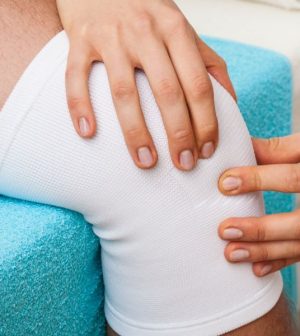- Could Your Grocery Store Meat Be Causing Recurring UTIs?
- Are You Making This Expensive Thermostat Error This Winter?
- Recognizing the Signs of Hypothyroidism
- 10 Strategies to Overcome Insomnia
- Could Artificial Sweeteners Be Aging the Brain Faster?
- Techniques for Soothing Your Nervous System
- Does the Water in Your House Smell Funny? Here’s Why
- Can a Daily Dose of Apple Cider Vinegar Actually Aid Weight Loss?
- 6 Health Beverages That Can Actually Spike Your Blood Sugar
- Treatment Options for Social Anxiety Disorder
Your Guide to Pain Relief After Knee, Hip Replacement

Getting a new knee or hip can be life-changing, but first you have to get through the recovery after surgery.
Experts say a combination of the right medications and some other tips will make it easier.
A mnemonic, or memory aide, that’s useful in this case is the word RICE. That stands for Rest, Ice, Compression and Elevation.
It’s important to rest after surgery, according to the American Association of Hip and Knee Surgeons. Keep a journal, listen to music or try other relaxation techniques if it’s hard to stay off your feet.
Apply ice packs for 20 to 30 minutes at a time, then take a break for 30 minutes before reapplying to help reduce swelling in the area of your surgery. The ice or cold pack should not directly touch your skin, but be buffered by a towel or flexible wrap to prevent frostbite.
A knee sleeve or a compression wrap can also be helpful, the surgeons advised. Compression decreases swelling, but it needs to be applied gently. If your foot goes numb or gets cool to the touch, you are wrapping it too tightly, according to a news release from the association.
Elevation could look like lying down and propping the leg on a pillow or other soft material. Your foot should be above your heart level.
Attitude also makes a difference, the experts said. A patient is typically less distressed when believing the pain is manageable.
Numerous non-opioid medications can be helpful without the same risks of addiction. Common medications used after joint replacement surgery include nonsteroidal anti-inflammatories (NSAIDs), acetaminophen, muscle relaxers, and drugs that target nerve pain.
A surgeon can provide instructions for using both prescription and over-the-counter NSAIDs. Those offered by prescription are meloxicam (Mobic), voltaren (Diclofenac), indomethacin (Indocin) and celecoxib (Celebrex). Over-the-counter medications are ibuprofen or naproxen (such as Advil, Motrin or Aleve). Aspirin may be used to decrease the risk of developing a blood clot.
Acetaminophen, or Tylenol, is another effective over-the-counter pain medicine and fever-reducer that can be used in combination with NSAIDs and other pain medicines. The combination of acetaminophen and NSAIDs can provide more effective pain control than either medicine alone.
Muscle relaxers may decrease pain related to muscle spasm. Two common muscle relaxers are methocarbamol (Robaxin) and cyclobenzaprine (Flexeril).
Nerve pain medications can also help. Gabapentin (Neurontin) or pregabalin (Lyrica) can target nerve pain and decrease the amount of opioids required after joint replacement.
Your surgeon may prescribe opioids, which may be necessary for the first few weeks after a joint replacement surgery. They are most commonly used before or after physical therapy and when trying to calm the pain during sleep.
Various opioid medications are available, and they differ in strength. They include tramadol (Ultram), hydrocodone (Vicodin) and oxycodone (Roxicodone, Percocet).
These opioid medications are highly addictive due to their ability to activate “reward centers” within the brain. Taking opioids on a regular basis also will cause a patient to develop a tolerance to the pain-relieving effects and require higher doses for pain relief.
Long-term use of opioids is not recommended whether before or after joint replacement surgery, the surgeons advised.
If a patient uses multiple types of medicines in conjunction with short-term opioids for severe pain after surgery, then it is less likely to lead to abuse or addiction. All unused pills should be disposed of at an authorized disposal location, which helps prevent misuse.
More information
The U.S. National Library of Medicine has more on hip and knee surgery.
SOURCE: American Association of Hip and Knee Surgeons, news release
Source: HealthDay
Copyright © 2026 HealthDay. All rights reserved.










